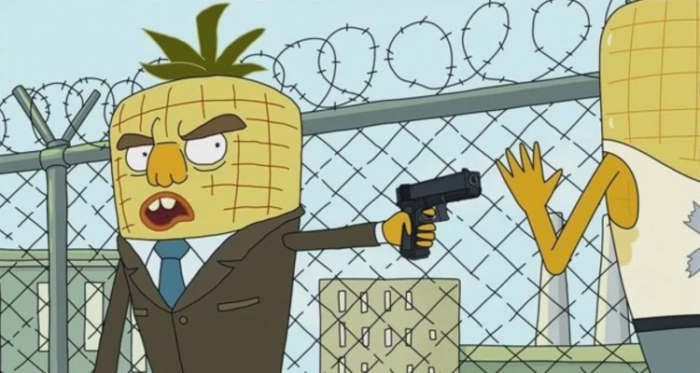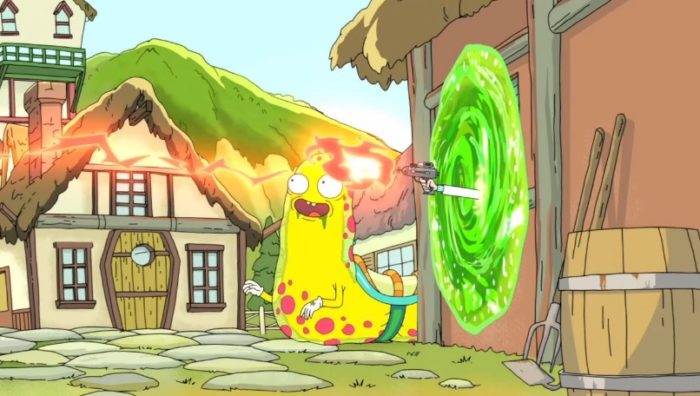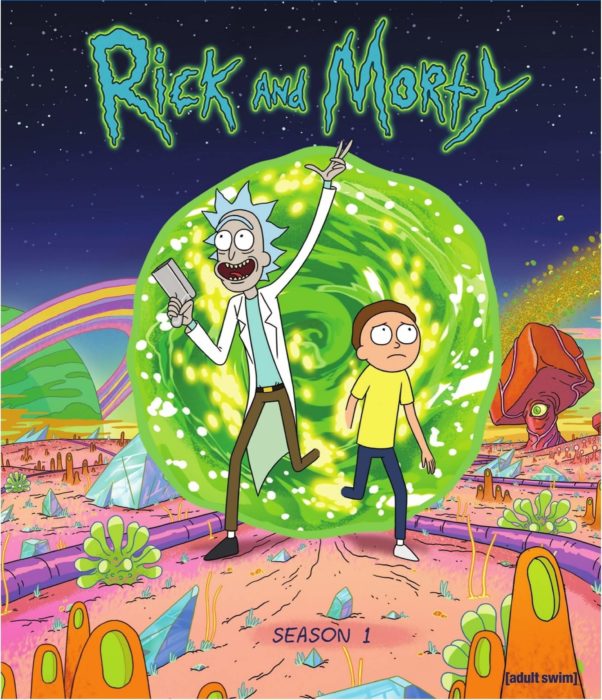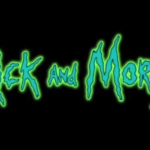Why Rick Killed King Jellybean: Exploring ‘Rick and Morty’
I did not set out to watch the animated show, Rick and Morty. In fact, it was the furthest thing from my mind. However, when I happened to walk by the TV in the living room at home, I glanced at the screen to see what the hubby was watching. On the screen showed a young boy, about thirteen or fourteen years ago, about to get sexually assaulted by a blue jellybean in a men’s room.
“What in the world are you watching?” I asked hubby.
“It’s called, ‘Rick and Morty’. It’s a pretty good show.”
“But there’s an anthropomorphic jellybean about to rape—,oh wait. No, the boy is about to kick his tail.” And Morty, one of the main protagonists of series, did kick the jellybean’s tail.
So begins my entrance into this world of Rick and Morty. This post only touches on elements of the show that appealed to me. If you’d like to watch it, it’s on Adult Swim on Cartoon Network. There are currently three seasons with a fourth planned for 2019.
Multiverses and lovers
Rick and Morty follows the wanderings of a grandfather and his grandson. Throughout this series, Rick Sanchez, the brilliant, alcoholic, mad scientist who’s extremely selfish, egotistical, condescending, and obnoxious, travels on adventures through an infinitesimal number of universes with his grand-on, Morty Smith. He scorns anything about the divine. “There is no God, Morty. Let me rip off that Band-aid right now.” Marriage, compassion, and all things positive are all merely illusions of absolutely nothing. He’s all about himself.
Morty is the submissive part of this dynamic duo who succumbs to his grandfather’s demands. Sometimes he wants to do go along on the adventures but most times, he doesn’t. Interdimensional travel really affects his time at school. He has a crush on a girl at school name Jessica but he’s rarely there to ever make anything of it. However, over the course of three seasons, Morty tends to just go along with his grandfather. And who wouldn’t? Seeing and meeting yourself in different universes really isn’t something to be missed.
The show plays around a lot with the multiverse within a nihilistic, atheistic worldview. You’re never sure if the Rick and Morty you started off with in Season 1 is the same in Season 3. As a matter of fact, as I discuss later, you know at least Rick and Morty aren’t the same. And one has to admit the interesting stories that come into play as they travel. Each episode is self-contained pretty much although there are Easter eggs throughout the series.
The absurdity of the show is extreme at times. There’s one episode where Rick reunites with an ex-lover: a hive mind entity named Unity which takes control of the entire population of an alien planet. Rick has wild, sexual escapes with his ex-lover but his influence causes the entity to lose control of the enslaved population which results into a race war. As all the people on the planet are blue, the race war has to do with whether or not your chest is coned shaped or if you have rings. Summer, Morty’s sister who happened to come along with them on this adventure, states: “Why don’t you all know you’re both the same?” Morty replies, “First race war, huh?”
Yet, this sort of purposeless zaniness is, dare I say it, a charm of the show even though I disagree with its themes and philosophical bents. The characters, even the supporting characters, are all strange with their own oddities.
Nothing matters
According to the creators of the show, Rick and Morty: The series addresses the insignificance of human existence as compared to the size of the universe, with no recognizable divine presence, as described by Lovecraft’s philosophy of cosmicism.
“Co-creator Dan Harmon, talking about the philosophy guiding the show and Rick’s nihilistic apathy, stated that “the knowledge that nothing matters, while accurate, gets you nowhere.” To find a sense of purpose and live a better life, one needs to focus on human relationships and experiences, and not preoccupy our minds with unanswerable questions.”
 This idea cannot be any clearer seen than in the episode entitled, “Rixty Minutes”. In this particular episode, the entire gang, compliments of Rick’s brilliance, are able to watch Interdimensional TV – basically, viewing television programming across different realities. To illustrate, in one reality, corn evolved into sentience. So, for instance, they’re watching a police procedural with corn people.
This idea cannot be any clearer seen than in the episode entitled, “Rixty Minutes”. In this particular episode, the entire gang, compliments of Rick’s brilliance, are able to watch Interdimensional TV – basically, viewing television programming across different realities. To illustrate, in one reality, corn evolved into sentience. So, for instance, they’re watching a police procedural with corn people.
Corn? Why not? It gets crazier than that but time won’t allow for all the various scenarios explored in this thirty-minute show.
Within this episode, Morty’s parents, Beth and Jerry, are able to view their alternative lives with interdimensional goggles. These are, of course, provided for by Rick. Beth, Morty’s mother, has a hang-up about being a horse doctor and not a “real” doctor. Jerry, is an insecure and unemployed husband. In their alternate lives, they see themselves as having achieved their goals. Beth, working on people. Jerry, a famous actor.
Summer, Morty’s sixteen-year-old sister, also attempts to view her alternate life through the goggles but can’t really see anything about herself. Come to find out, Summer is an unwanted pregnancy. Due to this, Beth and Jerry were unable to achieve their goals in life, or this dimension. As devastating as this is, as it would be to anyone, Summer threatens to leave the family. In fact, she’s packing in bags when Morty goes to her and tells her that he’s not really her Morty in this dimension. He’s a Morty from a different dimension that turned all the people into monsters. He and Rick packed up and moved to the dimension they’re currently in. While they were there, Summer’s Rick and Morty adverted the crisis that turned all the people in monsters in their reality only to be killed in an unexpected explosion in Rick’s lab. So, he and Rick buried their bodies on the lot next door.
After which Morty responds with this: “Nobody exists on purpose, nobody belongs anywhere, everybody’s gonna die. Come watch TV.” I’m not sure how but Beth finds this reassuring and she goes and watches TV with the family. More on this in a just a moment.
In the episode I referenced at the beginning of this post, where Morty almost gets sexually assaulted by the jellybean, called King Jellybean who is the ruler a village in the reality they are visiting, and loves children, Morty wanted to be a hero for a change instead of Rick. But then, when that whole assault thing happens, Morty, obviously shaken, comes out the bathroom and begs Rick to take him back home. Rick looks behind to see the battered form of King Jellybean but he doesn’t say anything. At the end of the episode, as they are about to leave, King Jellybean, on his exalted chair is paraded on the shoulders of the villagers. Morty hurriedly tells Rick to get going. They open the portal to go back home. As they exit, Rick’s gun peeks out the portal and with a healthy laser blast, shoots and kills King Jellybean, spurting his insides all over the village.
As you can see, this show is not a feel-good show in any sense of the word. “The characters of the show find ways to deal with cosmic horror and existential dread, either by asserting the utility of science over magic or by choosing a life in ignorant bliss.”
Why care?
Many Christians, and theists for that matter, would postulate the idea that a multiple universe, realities, and etc., would point to signs of a Creator. Although I do not believe a multiverse exists, I’m not completely against the idea because it would still have to come from the mind of our Creator, the God of the Bible. What the creators of the show want to show is that nothing matters. We’re not important. Dealing with tragedy and difficult situations have to be dealt with by either acknowledging our lives have little meaning or that in a different reality, your choices would be different and it wouldn’t matter in that world either. Instead of showing the awesomeness of a God who can create the complexities of a multiverse, instead, through nihilistic existentialism, they say, “See, there are a million of you in different realities. Who cares?”
In fact, as a viewer, you discover that all the Ricks in all the various realities got together and created the Citadel of Ricks. It is an entire planet (I think) of Ricks and Morties. I’ll explore this interesting part of the series in a later post but suffice to say, no matter which universe you enter, Rick and Morty are together. Rick has made much of how insignificance each of his family members are, including himself.
 But, the oxymoron of the show is this: if nothing we care about matters, if we’re not to answer the unanswerable questions of life, if we’re only mere accidents, why did Rick kill King Jellybean? So what if his fourteen year old grandson was about to be raped? Who cares? Oftentimes throughout the show, Rick dismisses Morty’s concerns but in this regard, Rick responded by killing King Jellybean. Later on, in the post credit scene (which happens every episode) a couple of villagers discover pictures in King Jellybean’s house implying he molested other children. They decide to burn the pictures and leave his image, a stone statute of a smiling King Jellybean with a child by his side, and not let the other villagers know of his true nature.
But, the oxymoron of the show is this: if nothing we care about matters, if we’re not to answer the unanswerable questions of life, if we’re only mere accidents, why did Rick kill King Jellybean? So what if his fourteen year old grandson was about to be raped? Who cares? Oftentimes throughout the show, Rick dismisses Morty’s concerns but in this regard, Rick responded by killing King Jellybean. Later on, in the post credit scene (which happens every episode) a couple of villagers discover pictures in King Jellybean’s house implying he molested other children. They decide to burn the pictures and leave his image, a stone statute of a smiling King Jellybean with a child by his side, and not let the other villagers know of his true nature.
Further, in the episode where with the hive mind loses her influence over the planet, she decides that Rick is a bad influence and leaves him. Rick, in despair, attempts to commit suicide but fails. Again, the question is this: why does this relationship matter if nothing matters? Why didn’t Rick simply say, “I’ll go to another universe and find you again.” The reason why is because the nihilistic worldview of the show fall under scrutiny. If human existence is peanuts, then what does it matter about family? Why care that your grandson was almost raped by a jellybean? Why be bothered by the loss of a lover? Because at the end of the day, no matter what the creators of the show wish to propagate, everyone matters and we’re all unique.
In the second article about the show, I’ll explore the dysfunctional family unit of Rick and Morty. Believe me, there’s a lot more to this family than what meets the eye.







































I only have a pop cultural knowledge of Rick and Morty, but it seems to have a lot in common with Adventure Time, which I do like. The absurdities, the surprise humor, the fact it has more to do with ideas and feelings but no so much logic.
Apparently Hulu has the first couple of seasons, but also apparently Hulu no longer lets you watch some old stuff as freebies (grumble grumble). Guess that means I’d have to fish around the internet for something that wasn’t copyright-blocked.
For people who like this style, I’d also recommend Bee and Puppycat, especially because Puppycat is voiced by a Vocaloid program (subtitled onscreen) and it’s somehow frickin’ brilliant.
Thanks for commenting! I’ve seen Adventure Time but for the most part, I don’t ‘GET’ that show as much as I got Rick and Morty. Perhaps it just didn’t appeal to me.
Complicated time line. Rick and Morty starts in our world. Or something like it. Reminds me of the Family Guy episodes featuring the talking dog and baby.
I haven only seen bits of Rick and Morty and was turned off by what I saw as excessive zaniness. But now I know there is a purpose behind the show, a deeper idea. Unfortunately, a nihilistic one.
Yes, it seems impossible for people to actually function in a universe in which everything is actually meaningless. Either that’s because God created us to be something more, or because of a tragic accident of evolution we can do nothing about. Of course I believe the very existence of reason and language and the fact we can even discuss this issue points to the former.
Thank you for sharing your observations on this show. I found it fascinating!
Yay! Thanks for responding, Travis.
If nothing means anything, why talk about it?
So awesome that you are covering this show. I have never watched the show myself but I watch Wisecrack’s philosophical analysis of the episodes. The circular reasoning and contradictory nature of Nihilism is depressing. It is a poison that kills people slowly, so glad that you are shining a light on the absurdity of the philosophy of this popular show. Rick and Morty shows me that people are hurting and looking for answers, for a reason, for a purpose. Fortunately we have the opportunity and chance to show people that the answers, reason, and purpose can be found in Christ. Can’t wait to read your further thoughts!
Hi Aaron,
Thank you for commenting. I did do an second part to the show here if you’d like to review it. http://speculativefaith.lorehaven.com/why-rick-created-froopyland-exploring-rick-and-morty/
I’d be interested in your thoughts as well!
King Jellybean sounds like a celebrity as well as a monarch.
Have you read The Dark Tower, Parker? This unfinished MS by C.S. Lewis seemed to tackle the multiverse. Sadly he never finished it. A lot of evangelical pearl clutchers say Lewis couldn’t have written it.
Why? It was too DARK and like all good Christian writers Lewis only wrote sweet, little fairy tales about plush lion toys and tinsel in the back of your closet. Lol